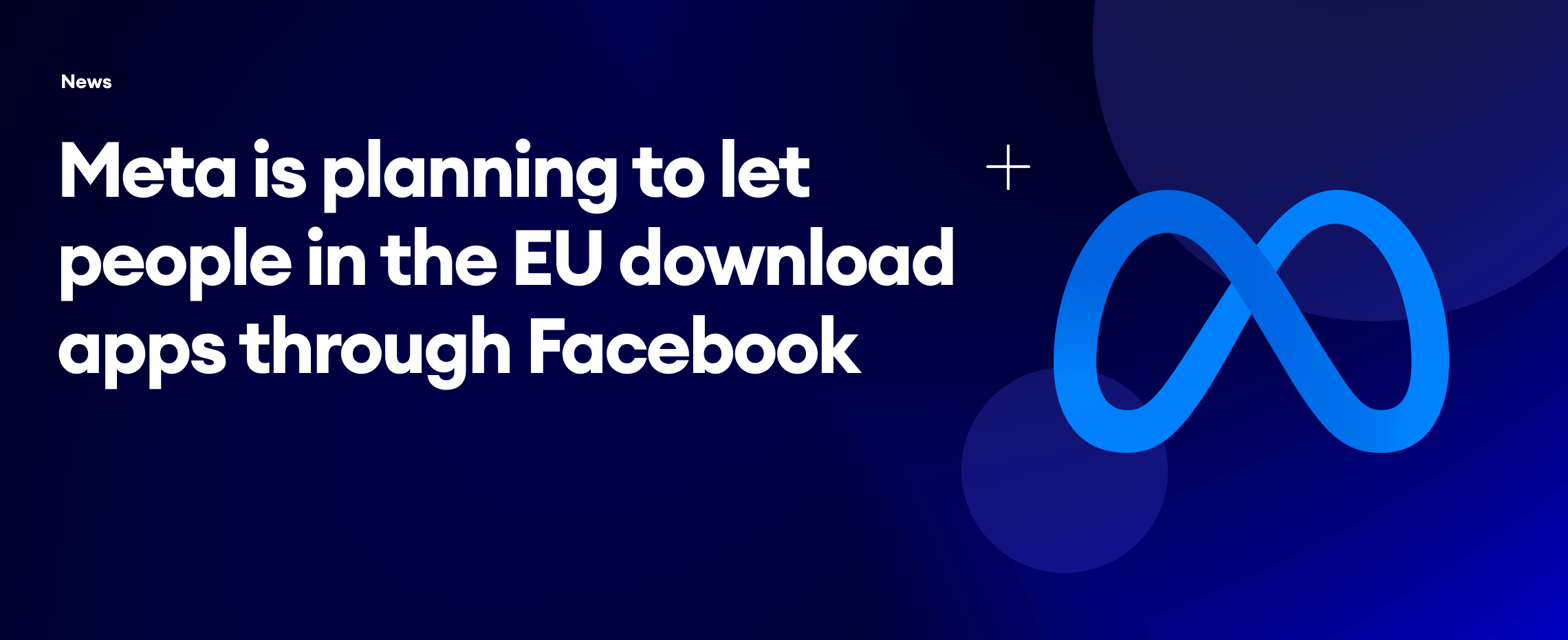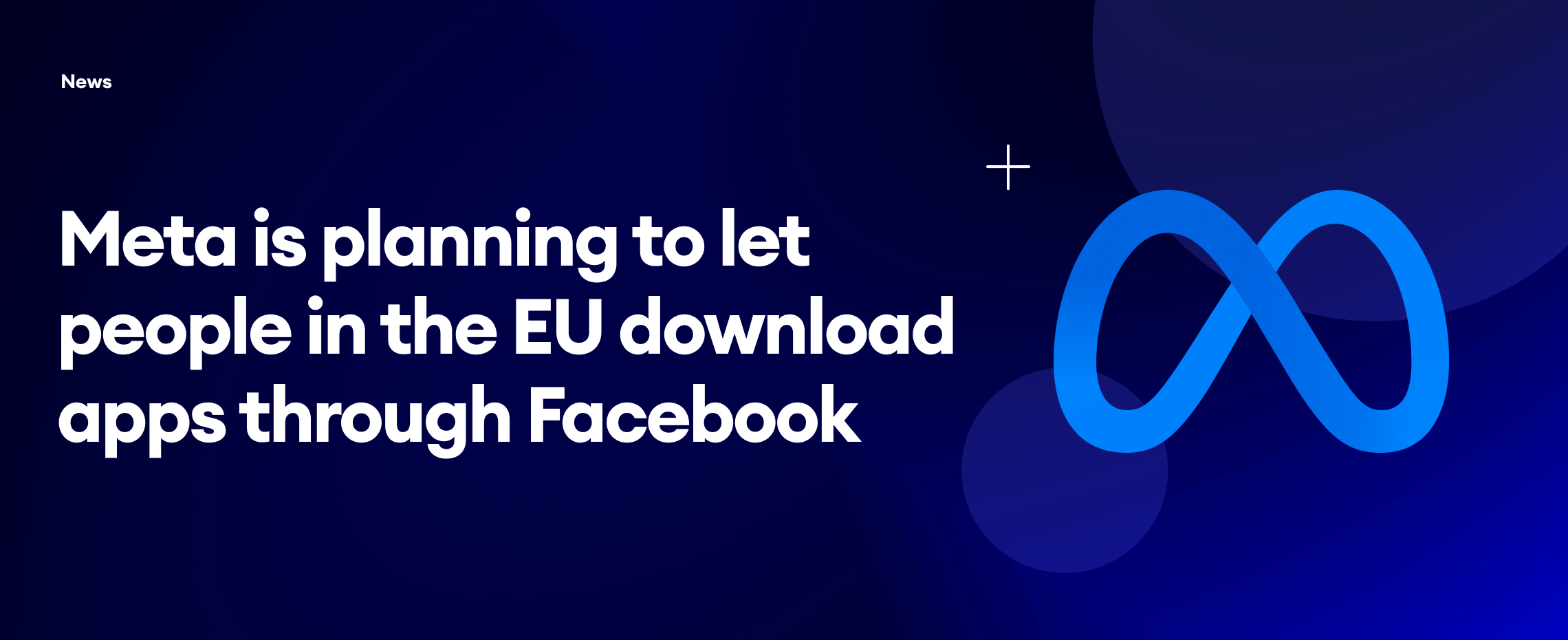Meta, the tech behemoth, is gearing up for an intriguing pilot program that could mark the onset of its rivalry with Google’s Play Store and Apple’s App Store. Informed sources indicate that Meta intends to roll out a novel ad format within the European Union, allowing users to download Android apps through Facebook ads directly.
This strategic maneuver is riding on the tailwinds of the anticipated Digital Markets Act (DMA), set to be enacted in the European Union. The DMA, a paradigm shift in regulatory landscapes, categorizes giants like Apple and Google as ‘gatekeepers’, mandating them more flexible in permitting alternative avenues for app distribution on their mobile platforms.
Even though Android does possess a sideloading feature, Google has historically thrown roadblocks by intricately tying its Play Store to in-app billing and licensing. Moreover, the ominous warning messages that pop up while attempting to download apps from sources beyond the Play Store create an apprehensive user environment. However, Meta’s decision to spearhead this experiment on Android instead of Apple’s iOS may stem from a comparatively less restrictive ecosystem.
Meta’s proposition to developers is enticing; by permitting direct app downloads through Facebook without transitioning to the Play Store, the tech giant is betting on improved conversion rates for app installations. As a further sweetener, it is said that Meta will not be dipping into the in-app revenue pool during the pilot phase, granting developers the autonomy to employ their preferred billing systems.
A spokesperson for Meta validated the initiative, expressing that the company has “always been interested in helping developers distribute their apps, and new options would add more competition in this space. Developers deserve more ways to easily get their apps to those who want them.” Google has yet to comment on this development.
Meta is not an isolated player in this realm. Earlier this year, Microsoft divulged its ambitions to debut an alternative app store specifically for games on iOS and Android platforms in Europe following the activation of the DMA.
In conclusion, the impending DMA is setting the stage for tectonic shifts in the mobile app distribution landscape in the EU. With Meta’s foray into this domain, app developers and consumers alike could witness greater choices and potentially better terms. As this space continues to evolve, all eyes will be on how the established gatekeepers, Google and Apple, respond to these challenges.
What is DMA?
Security Concerns
One of the significant apprehensions with sideloading and alternative app distribution channels is security. Google Play Store and Apple’s App Store have, over the years, developed sophisticated mechanisms to weed out malicious apps. Will Meta establish similar or better safeguards to protect users from potentially harmful content?
Developer Attraction
For Meta’s endeavor to be successful, attracting a critical mass of developers is essential. With no cut on in-app revenues during the initial phase, Meta is making an alluring proposition. However, in the long run, developers will be evaluating the user base, discoverability, and potential for monetization on this new platform as compared to established players.
User Adoption
For consumers, the choice of where to download apps will be a game of trust. Established platforms have built reputations over the years, and Meta will need to ensure a smooth user experience, safeguard user data, and provide compelling reasons for consumers to consider this alternative path for app installations.
Regulatory Compliance
While the DMA is pushing for more openness, Meta must tread carefully regarding compliance with existing and upcoming data protection laws. The GDPR (General Data Protection Regulation) is especially critical in this context, as Meta will need to ensure user data is handled with the utmost care.
Market Reaction
Apple and Google are unlikely to remain passive as Meta ventures into their turf. They might revamp their strategies, offer more enticing terms to developers, or innovate in ways that could neutralize the advantages Meta is trying to carve out. Moreover, they might also look into leveraging their ecosystems by integrating deeper services that make their platforms more appealing.
International Expansion
While the current focus is on the EU market due to the DMA, Meta’s long-term vision will likely involve expansion to other regions. However, this raises questions regarding how different regulatory environments might affect or even constrain Meta’s ability to offer similar services globally.
As Meta throws its hat into the app distribution ring, the ensuing developments hold the promise of reshaping the mobile app ecosystem. The initial phases are bound to be experimental, with players gauging the waters. However, this endeavor could have far-reaching consequences, heralding an era of increased competition, innovation, and possibly consumer benefits in the mobile app domain. The stakeholders, including developers, consumers, and competitors, need to stay vigilant and adaptive in this evolving landscape.
How Meta’s New App Distribution Channel Works for Mobile Developers?
As Meta sets its sight on the app distribution market, mobile developers stand to be one of the most impacted stakeholders. The new distribution channel Meta is piloting can bring in opportunities, but it’s essential to understand how it will work for mobile developers.
Easy Integration
One of the major factors that will determine the success of Meta’s initiative is the ease of integration. Meta is likely to provide developers with a streamlined process to onboard their apps onto its new distribution channel. This might include SDKs, APIs, and documentation to help developers integrate their apps smoothly with Meta’s ecosystem.
Improved Conversion Rates
Meta claims that by allowing users to download apps directly through Facebook without being redirected to Google’s Play Store, developers may experience higher conversion rates. The reduced friction in the user journey from seeing an ad to installing the app could lead to a higher number of successful installs.
Freedom in Monetization
At least in the initial phase, Meta does not plan to take a cut from in-app purchases or other revenue generated by the apps. This could give developers more leeway in experimenting with different monetization strategies without the worry of sharing a significant percentage with the platform.
Enhanced Targeting and Analytics
Meta’s stronghold in social media could also benefit developers in terms of targeting and analytics. With access to a plethora of user data, Meta might provide enhanced targeting options for app install ads. Additionally, developers could gain insights into user behavior and app performance through sophisticated analytics tools that Meta could offer.
Discoverability Challenges
While the direct download option might lead to higher conversion rates, developers may face discoverability challenges on a new platform. Unlike Google Play Store, which has a structured system for app discovery, Meta’s ecosystem is primarily ad-driven. Developers may need to adapt their strategies for visibility and discovery within Meta’s platform.
Security and Privacy Compliance
Developers need to be cognizant of security and privacy norms. Meta will have to ensure that the apps distributed through its platform comply with GDPR and other relevant regulations. For developers, this means rigorous adherence to data protection and user privacy norms.
Competition and Differentiation
As more developers get on board, competition within Meta’s new distribution channel is likely to intensify. Developers will need to find ways to differentiate their apps and make them stand out among the multitude. This may involve innovative features, outstanding user experiences, and effective marketing strategies.
Meta’s entry into app distribution holds the potential to be a game-changer for mobile developers. With promises of better conversion rates, more freedom in monetization, and access to Meta’s vast data resources, it’s an enticing proposition. However, developers must be mindful of the challenges such as discoverability, competition, and compliance with security and privacy norms. Adapting to this new landscape will require a blend of innovation, agility, and strategic thinking.
Unraveling Meta’s App Distribution: Implications for the Advertising Market
Meta’s foray into the app distribution landscape is bound to have reverberations within the advertising industry. The company’s massive advertising engine, combined with the new app distribution channel, could redefine how advertisers approach mobile app promotions. Let’s delve into how this integration could reshape the advertiser market.
Targeted App Install Campaigns
Meta’s advertising expertise, coupled with direct app downloads, could present advertisers with refined targeting for app install campaigns. With access to extensive user data, advertisers could craft highly personalized campaigns that cater to specific user preferences, which could translate into higher engagement and conversion rates.
Shortened User Journey
The new distribution model significantly shortens the user journey from seeing an ad to installing an app. This elimination of additional steps, such as being redirected to an app store, may result in reduced drop-offs and, consequently, an increase in successful app installations. Advertisers could see this as an opportunity to maximize ROI on app install campaigns.
Enhanced Attribution Models
Attribution – understanding what led a user to install an app – is critical for advertisers. Meta’s integrated approach could lead to the development of more accurate attribution models, enabling advertisers to pinpoint the exact impact of their campaigns. This could pave the way for smarter, data-driven decisions that optimize campaign performance.
Diversified Ad Spend
With an additional distribution channel in the mix, advertisers might diversify their ad spend. Meta’s platform could become an attractive alternative to Google and Apple’s app stores for certain types of campaigns, especially those focused on immediate conversions. A diversified ad spend could mitigate risks and open up new avenues for reaching audiences.
Innovative Ad Formats
Meta’s move may prompt innovations in ad formats tailored to the direct download functionality. We could witness the advent of interactive or immersive ads that are more engaging and facilitate instant app downloads. Such ads might incorporate richer media, user interactions, or even AR/VR elements, particularly since Meta has been heavily investing in the metaverse.
Competitive Landscape
As Meta steps into the app distribution domain, it’s likely that other players, including Google and Apple, will respond. This could foster a competitive environment where platforms innovate to provide advertisers with more value. The advertising market could benefit from this competition through better ad products, targeting options, and analytical tools.
Data Privacy Considerations
However, advertisers must also tread cautiously regarding data privacy. With GDPR and other data protection regulations, there’s a growing emphasis on user privacy. Advertisers will need to ensure that their targeting and data handling practices comply with these regulations, especially in a landscape that is likely to be under heightened scrutiny.
Meta’s venture into app distribution stands to bring a wave of innovation and opportunities to the advertising market. With streamlined user journeys, enhanced targeting, and potentially new ad formats, advertisers have much to gain. However, in this evolving landscape, it is imperative for advertisers to stay agile, keep abreast of regulatory compliances, and adapt their strategies to maximize the opportunities presented by Meta’s new app distribution channel.
Affise MMP – How we are ready!
Integration with Meta’s APIs
To ensure smooth operation with the application distribution channel, Affise MMP is fully integrated with the Meta API. This will also include adapting to APIs designed to install apps, interact with users, and track conversions. Full integration ensures efficient data exchange between the two platforms.
Improved attribution modeling
Affise MMP develops complex attribution models that take into account the direct installation of applications from the Meta platform. These models should accurately link app installations and in-app events to the relevant advertising campaigns, allowing marketers to evaluate the effectiveness of their advertising.
Data privacy compliance
In accordance with the GDPR and other privacy provisions, Affise already ensures that all data processing and tracking mechanisms comply with the relevant laws. This implies a transparent data processing practice and ensures that the user’s consent is obtained where necessary.
Advertising campaigns optimization
Affise offers tools and analytical information that can help advertisers optimize their campaigns on the new Meta distribution channel. By analyzing data on user engagement and conversions, Affise can make recommendations on targeting, content selection, and advertising creatives, guaranteeing advertisers maximum return on investment in their campaigns.
Real-time analytics
Providing real-time analytics is crucial for advertisers who track the effectiveness of their campaigns on the Meta platform. Affise fulfills this need and is constantly developing additional mechanics in data analysis so that its analytical panel can provide data on application installations, user engagement, and other relevant indicators from the Meta platform in real-time.
Final Thoughts
As Meta heralds new possibilities in app distribution, Affise MMP, through robust integration, sophisticated attribution modeling, and advanced analytics, Affise could facilitate advertisers in maximizing the opportunities Meta’s new distribution channel presents.
You can check out Affise MMP below:
Affise MMP user documentation
Affise MMP technical documentation


